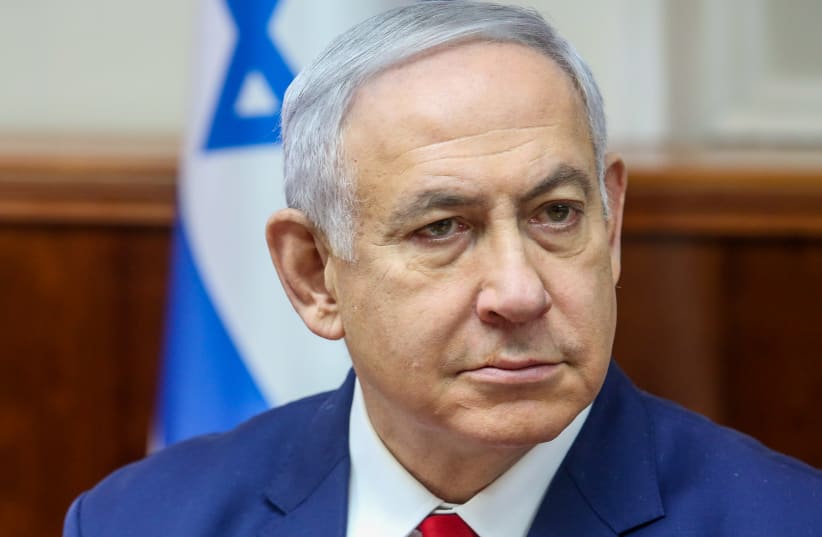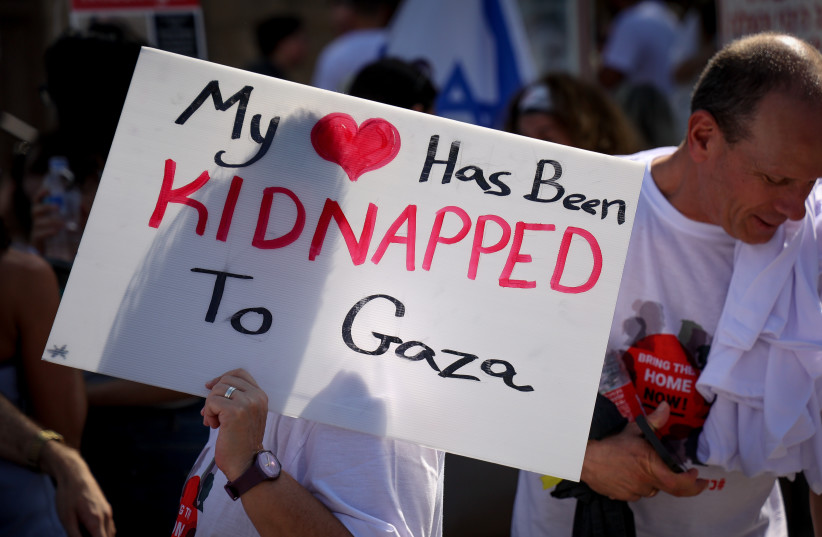Netanyahu spoke as a Hamas delegation was in Cairo for hostage talks with CIA Director William Burns and officials from the mediating countries Egypt and Qatar.
TOVAH LAZAROFF MAY 5, 2024 16:41
Updated: MAY 5, 2024 16:42

Israel is prepared to pause the Gaza war in exchange for a deal to release the hostages but is not willing to end it, Prime Minister Benjamin Netanyahu said during the weekly government meeting on Sunday.
“We are working in every possible way to free the hostages; this is our top priority.,” he said.
Netanyahu spoke as a Hamas delegation was in Cairo for hostage talks with CIA Director William Burns and officials from the mediating countries Egypt and Qatar.
Simultaneously, Hamas in Gaza fired rockets at the area of the Kerem Shalom crossing for goods into the enclave, injuring seven.

Kfar Aza residents and People call on the release of Israelis held hostage by Hamas terrorists in Gaza, outside the Ministry of Defense in Tel Aviv. October 26, 2023. (credit: Jonathan Shaul/Flash90)
Defense Minister Yoav Gallant told soldiers in the south that there were “troubling signs that Hamas does not mean to agree to any deal.”
At the government meeting, Netanyahu said that “Israel has been, and still is, ready for a pause in the fighting in order to free our hostages,” Netanyahu stressed as he explained that the IDF had already allowed for a week-long lull in the fighting in November to facilitate at hostage deal in which 105 captives were freed.
“This is what we are ready to do today,” he stated.
A deal is on the table, in which some 33 of the remaining 132 hostages would be freed over 40 days, in what would be the first phase of a three-part deal.
Hamas had reportedly agreed to the first phase, which would include a pause to the war, without an agreement to end the war, with the understanding that such a step would happen later in the process.
Netanyahu says not intent on relenting
Netanyahu, however, has clarified, including on Sunday, that he has no intention of relenting on the issue of a permanent ceasefire until Hamas has been destroyed. That can not happen until the IDF executes a military operation in Rafah.
“Israel will not agree to Hamas’s demands, which would mean surrender; it will continue fighting until all of its objectives are achieved,” he stated.
“In the last few weeks we have been working around the clock to forge an agreement for the return of the hostages,” Netanyahu said, adding that the negotiating team was given a very broad mandate about terms they could agree to.
“In recent weeks, we have been working around the clock to formulate an agreement that would return our hostages,” Netanyahu explained.
The negotiating team was given a “very broad mandate to move forward on the release. We did so out of a deep commitment to the hostages, and to end the terrible suffering of the families,” he stressed.
“Throughout the negotiations, Israel has shown a willingness for significant movement, which has been described by US Secretary of State Blinken and others as ‘very generous.’
“But while Israel has shown this willingness, Hamas has still held to its extreme positions, first and foremost the withdrawal of our forces from the Strip, the conclusion of the war and leaving Hamas intact,” Netanyahu said.
Israel can not accept a situation “in which Hamas’s battalions leave their tunnels, reestablish control over the Strip, rebuild their military industries and go back to threatening the citizens of Israel in the communities of the Western Negev, the cities of the south and throughout the country,” Netanyahu said.
In Cairo, Hamas leaders held a second day of truce talks with Egyptian and Qatari mediators, with no apparent progress reported as the group maintained its demand that any agreement must end the war in Gaza, Palestinian officials said.
Hamas leader Ismail Haniyeh said on Sunday that the Palestinian militant group was keen on reaching a comprehensive ceasefire that will end Israeli “aggression,” guarantee Israel’s withdrawal from Gaza, and achieve a serious hostage-swap deal.
Haniyeh, in his statement, also blamed Israeli Prime Minister Benjamin Netanyahu for “the continuation of the aggression and the expansion of the circle of conflict, and sabotaging the efforts made through the mediators and various parties.”
In Jerusalem, Netanyahu stressed that surrounding Hamas’s demands to end the war would only ensure that the terror group would, in the future, carry out another October 7-style attack.
Such a surrender would be a “great victory for Hamas, Iran, and the entire axis of evil” and would “exhibit terrible weakness to our friends and our enemies.”
Content retrieved from: https://www.jpost.com/israel-hamas-war/article-799946.